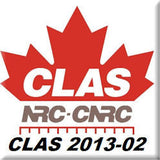Industrial Weights For Scale Calibration
Industrial Weights For Scale Calibration
- Contact Now for Immediate Pricing
- 1(800)-268-3269
- inquiry@interweigh.ca
Interweigh Systems supplies individual weights in either stainless steel or cast iron that is used to verify mass at an industrial usage level of accuracy, specifically NIST Class F.

Our ISO Scope of Accreditation and Calibration
Interweigh’s CAN-P-4E & ISO/IEC 17025:2005 Scope of Accreditation and Scope of Calibration & Measurement Capabilities. These documents are in pdf format and require Acrobat 4.0 or higher.)
2. Stainless Steel or Cast Iron Individual Industrial Weights or Sets:
Definition:
These individual weights in either stainless steel or cast iron are used to verify mass at an industrial usage level of accuracy, specifically NIST Class F.
Suppliers:
Interweigh Systems Inc. or Rice Lake Weighing Systems.
Model:
Sizes to meet any industrial weight requirement, in either stainless steel or cast iron.
History:
Interweigh has been supplying weights for over 20 years. Both Rice Lake and Interweigh are ISO 17025:2005 accredited calibration laboratories.
Description:
Stainless steel industrial weights come in various shapes, including cylindrical, grip handled, dish, cube, slotted, ring or leaf. Each is available in either metric or avoirdupois.
Metric: 30 kg to 1 mg
Avoirdupois: 50 lb to 0.005 lb
Cast iron industrial weights come in various shapes, including grip handled, heavy capacity grips for forklifts, nesting slabs and round/square/triangular/hexagon slotted interlocking.
Metric: 2000 kg to 200 g
Avoirdupois: 5000 lb. to 7 oz
Advantages:
Why purchase Class F Industrial Weights from Interweigh? We can offer you a full range of weights to meet any and all weight requirements, and then offer you a traceable weight calibration service through our own Calibration Lab in Markham to ensure your weights are kept accurate and your calibration reports up to date.
Applications:
Class F weights are used by: - all industries to confirm the calibration of industrial scales of all capacities. - other Scale companies to replace or add weights for their own use. - Retail outlets to verify their retail scales.
Before ordering test weights and weight sets, it is important to consider your application, the environment the test weights will be housed in, what tolerance and type of test weights you need as well as if you need any official documentation. Please use the following questions below to prepare your order. If there is missing information or if you have any questions regarding what you need, please call 800-268-3269.
Application/Environment
- Please describe your application and tell us what you need to accomplish with the weight(s) or weight set.
- What is the maximum amount of weight you will need at any one time?
- What is the minimum amount of weight you will need at any one time?
- Do you need something that is custom manufactured?
- What is your budget for this project?
- Tell us about your environment. Is it:
- Indoor/outdoor?
- Wet/dry?
- Windy/still?
- Corrosive, hazardous or explosive?
- A clean room?
- An environment with biohazard, electrostatic or magnetic conditions to consider?
- An environment with other noteworthy conditions? If so, what are they?
- Are you replacing an existing weight or weight set?
- If the answer to question number 7 is yes:
- What do you like/dislike about the existing weights?
- What configuration is the existing set?
- What style is the existing set?
- What laboratory documentation is needed for the existing set?
- Does this weight set need to be Legal for Trade?
- What other precision services/equipment (recalibration, balances, accessories, static electricity) do you use?
Tolerance/Type of Weights
- What tolerance are you looking for?
- Is your tolerance driven by the equipment under test, the application, an internal specification, a document or another source?
- What "style" (ASTM, OIML, NIST) is required or preferred?
- What configuration do you need (5-2-2-1, 5-3-2-1)?
Documentation
- Do you need ISO/IEC 17025 laboratory documentation?
- If you do not need ISO/IEC 17025 laboratory documentation, do you need traceability to NIST?
- Do you need a Calibration Report?
Your existing weights and weight sets should be recertified on a managed periodic basis. The recertification period is determined by a number of factors, including but not necessarily limited to, the environment, frequency of use, demands of the process, quality of the weighing devices in question, age of the weights in question and handling during use.











